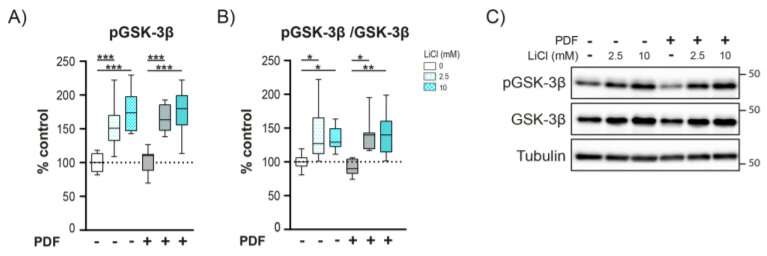Fig. S1: LiCl-supplemented PDF inhibits GSK-3β by increased GSK-3β phosphorylation in primary human peritoneal mesothelial cells. Primary HPMC were exposed 30 min to PDF with or without 2.5 or 10 mM LiCl and analyzed by Western blot following 16h recovery in the continued presence of LiCl. (A) pS9GSK-3β abundance corrected for total protein loading (β-Tubulin) and (B) for total GSK-3β abundance. (n=10 representing 2 independent samples from each of 5 individual donors) *** P<0.001, ** P=0.0011, * P<0.05, one-way ANOVA with Tukey’s as post-hoc. (C) Representative Western blots. Credit: DOI: 10.1126/scitranslmed.aaz9705
Peritoneal dialysis, like classical haemodialysis, is a form of renal replacement therapy that can often only be used for a limited time as a result of the failure of the peritoneum. Researchers of MedUni Wien were now able to demonstrate that a specific protein is causally involved in fibrotic degeneration of the peritoneum. A new dialysis solution with added lithium developed at the Christian Doppler Laboratory for Molecular Stress Research in Peritoneal Dialysis can prevent this negative development and reduce complications. The results were published in Science Translational Medicine.
The number of patients suffering from chronic kidney disease or loss of kidney function is increasing worldwide and with it the number of people who need renal replacement therapy. The loss of kidney function affects approximately 3 million people, from infants up to geriatric patients. The increasing numbers (5 to 8 percent per year) are partially due to the increase in hypertension, diabetes and aging.
New solutions are to prevent inflammations and tissue damage
One of the most important tasks of the kidneys is the filtering of metabolite from the blood. If the kidneys are no longer able to perform this task, the blood has to be cleansed and drained artificially by way of dialysis (blood washing). Some patients apply the flexible method of peritoneal dialysis (PD), which uses the membrane of the peritoneum as a filter. The advantage over classical haemodialysis is that it can be performed independently at home, which improves the quality of life. In addition, this vascular-sparing form of removing excess water and dissolved urinary substances can often better preserve any remaining kidney function. However, the solutions used in the peritoneal dialysis are still the weak point of the therapy. They can trigger fibrosis, vascular damage and inflammations.
Innovative solutions are supposed to help preserve the peritoneum for as long as possible to allow patients to live as normal a life as possible or wait for a transplant. The new concept of cyto-protection through additions to PD solutions originates from research at MedUni Vienna's Department of Paediatrics and Adolescent Medicine. This strategy of reusing medicinal products as additives also provides accelerated and cost-effective clinical testing and application.
"Following our concept of supplementing PD fluids with cyto-protective additives, our current study revealed that lithium chloride (LiCl) improves cell survival in the face of otherwise harmful exposure to PD solutions," explains Klaus Kratochwill, head of the Christian Doppler Laboratory for Molecular Stress Research in Peritoneal Dialysis at MedUni Vienna.
First-time author Rebecca Herzog and colleagues identified αB-crystalline as a key protein in analyses of peritoneal mesothelial cells from patients. This was upregulated in all experiments by stimulation with PD fluid and promoted the change from epithelial cells to mesenchymal cells. However, the addition of lithium chloride decreased αB-crystalline, reduced peritoneal thickening and decreased the expression of fibrosis markers in the mesothelial cells. "Our results show that adding lithium chloride could prolong peritoneal dialysis therapy in humans," Herzog explains. Kratochwill adds: "This helps to ensure that those affected can receive this more flexible method of kidney replacement therapy in the future with fewer complications and thus for longer and with a better quality of life."
More information: Rebecca Herzog et al, Lithium preserves peritoneal membrane integrity by suppressing mesothelial cell αB-crystallin, Science Translational Medicine (2021). DOI: 10.1126/scitranslmed.aaz9705
Journal information: Science Translational Medicine
Provided by Medical University of Vienna





















